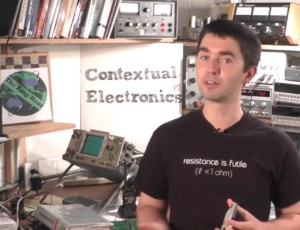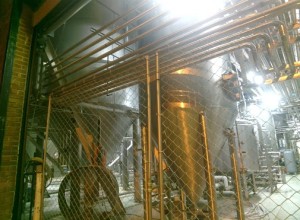Podcast: Play in new window | Download
Subscribe: Apple Podcasts |
 In this episode of The Engineering Commons, we answer questions from listener Jared about coping as an engineering student.
In this episode of The Engineering Commons, we answer questions from listener Jared about coping as an engineering student.
- Carmen informs us that making accurate estimations is an important engineering skill.
- In this episode, we answer questions from listener Jared about surviving the math-science death march encountered in the typical engineering curriculum.
- It’s normal to “just get by” in some of your engineering courses; not every class will speak to your academic strengths and professional interests.
- Engineering schools seeking in the United States and Canada that seek ABET accreditation are reasonably free to choose math requirements for their engineering degrees; ABET only requires “one year of a combination of college level mathematics and basic sciences.”
- Brian notes that engineers and mathematicians approach math differently.
- MIT professor Gilbert Strang has argued that linear algebra should be emphasized over calculus in the engineering curriculum.
- Many systems do not have a closed-form (analytic) solution, as it the case with the n-body problem.
- It is common for engineers to use only algebra during their professional careers, but the training received in advanced math seems to prove beneficial.
- We once more stumble onto the long and glorious history of the Turbo-Encabulator.
- Jeff made heavy use of note cards while preparing for his area exams.
- Carmen benefited doing his engineering homework as part of a study group, while Brian found open-ended research projects the best way to master important material.
- Even when the semester is not going well, it’s important to avoid writing off a class entirely.
- Brian finds value in watching the slightly unconventional YouTube videos of ElectroBOOM, while Carmen enjoys the educational aspects of Alan Wolke’s electronics tutorials.
- Someday, in the distant future when he has more time, Jeff would like to construct the coffee-can radar developed by Gregory Charvat.
- Spaced repetition is a learning method that revisits material in accordance with a schedule designed to maximize retention.
- Repeated retrieval of information from memory is one of the best ways for students to master scientific topics.
- Students don’t necessarily learn any more from a charismatic lecturer.
- One can find lots of advice on surviving engineering school, but keep in mind that the objective is becoming an employed engineer.
Thanks to Jimmy Harris for use of the photograph titled “Oriel College, Oxford.” Opening music by John Trimble, and concluding theme by Paul Stevenson.
Podcast: Play in new window | Download
Subscribe: Apple Podcasts |
 Founding co-host Chris Gammell returns to The Engineering Commons to talk about the importance of interdisciplinary skills with Adam, Carmen and Jeff.
Founding co-host Chris Gammell returns to The Engineering Commons to talk about the importance of interdisciplinary skills with Adam, Carmen and Jeff.
- Knowledge of heat transfer is useful in circuit design, acknowledges Carmen.
- As part of a required engineering class, sixteen Harvard students designed a smoker for cooking the “perfect” beef brisket.
- Chris’ educational site, Contextual Electronics, is preparing to start its third year of operation.
- To avoid software versioning problems, the Contextual Electronics team uses Vagrant, a software program that automates the creation and configuration of virtual development environments.
- Chris continues his work with SupplyFrame to develop parts.io, an online electronics search engine.
- Networking through meetups (like the group Chris founded in Cleveland) is important for maintaining industry contacts and staying abreast of technical trends.
- As the proud owner of a new Wilson II 3D printer, Chris is developing some new technical skills. He hopes to use the printer for enclosure design and fixturing.
- Jeff theorizes that ongoing reductions in engineering staff, along with automation of specialized tasks, is forcing many engineers into develop a greater range of interdisciplinary skills.
- The rate of business formation has been declining in the US over the past decade; Chris notes he has nonetheless seen an increasing number of small engineering firms.
- Foreseeing economic downturns in his first job, Chris actively developed new skills to improve his employability in other technical fields.
- Being a worry wart, Jeff wonders if advances in artificial intelligence will relegate engineers to providing technical guidance, rather than implementing technology directly.
- Adam notes a nearly mandatory requirement for professional engineering (PE) licenses has led to an “apprenticeship” arrangement in civil engineering.
- Carmen recalls Jeff Keyzer’s description of “T-shaped” employees during a past episode of The Amp Hour, which is also described in the Valve new employee handbook (pdf).
- Having a support group can be a great advantage in trying to learn new skills, notes Chris.
- Chris comments on the importance of sharing engineering stories, as is done on The Amp Hour, Spark Gap, and Embedded podcasts, as well as The Engineering Commons.
- Our guest can be found on Twitter as @Chris_Gammell.
Thanks to vxla for use of the photo titled “IC 100 at Chicago Union Station.” Opening music by John Trimble, and concluding theme music by Paul Stevenson.
Podcast: Play in new window | Download
Subscribe: Apple Podcasts |
 We talk about context and learning with Chris Gammell, founder of the Contextual Electronics series of instructional videos.
We talk about context and learning with Chris Gammell, founder of the Contextual Electronics series of instructional videos.
- Adam’s favorite lab course in school was Bituminous Materials, which investigated the properties and characteristics of asphalt.
- Our guest, Chris Gammell, recently tweeted about Christmas Ale from the Great Lakes Brewing Company, and we inquire about his affection for this particular beer.
- Chris took a few photos inside the brewery during a recent tour:
- A list of Christmas beers (from a few years back) can be found on the Draft Magazine website.
- Jeff mentions a cooling jacket for brewing lagers that he originally saw on Kickstarter.
- Chris has recently launched a venture, Contextual Electronics, which aims to teach practical skills to those interested in electronics.
- An interactive teaching method, known as Peer Instruction, was created by Harvard Physics professor Eric Mazur to overcome the difficulty that experts have in teaching concepts to beginners.
- A book titled How to Teach Adults provided our guest with some insights about how to organize his instructional material.
- Chris surveyed listeners of The Amp Hour podcast to determine what subject matter should be included in his instructional videos.
- Some existing online resources, in the area of electronics, include Dave Jones’ EEVblog, the Curious Inventor website, and videos by Ben Krasnow, Jeri Elsworth and Alan Wolke.
- Conceptual Electronics is using the open source program KiCad for designing printed circuit boards (PCBs).
- Massive open online courses (MOOCs) are currently a popular topic in the education community.
- Chris has been working with a beta-test group of students to smooth out the rough edges of the course.
- Our guest took inspiration from instructional programs such as Destroy All Software and cadjunkie.
- Fedevel Academy offers a training program for Altium Designer.
- An introductory video program titled Getting to Blinky is available on the Contextual Electronics YouTube channel.
- Chris is quite pleased with his experiences using Vimeo for video distribution. He has already produced 150 videos for his instructional program.
- On a monthly basis, Chris gets together with the Charged Conversation group, comprised of electronics professionals from the Cleveland, Ohio area.
- One of our guest’s sources for marketing ideas is Seth Godin, who often talks about the power of story-telling.
- A project dedicated to creating all the tools needed to build a small village is Open Source Ecology.
- More information about Chris’s instructional program is available on the Contextual Electronics website.
- You can follow Chris on Twitter as @Chris_Gammell, and can listen to his weekly podcast with Dave Jones at The Amp Hour.
Thanks to Chris Gammel for allowing us to use a screen grab from one of his introductory videos as the main image for this episode. Podcast theme music provided by Paul Stevenson
Practical insights for the engineering crowd
 In this episode of The Engineering Commons, we answer questions from listener Jared about coping as an engineering student.
In this episode of The Engineering Commons, we answer questions from listener Jared about coping as an engineering student.


